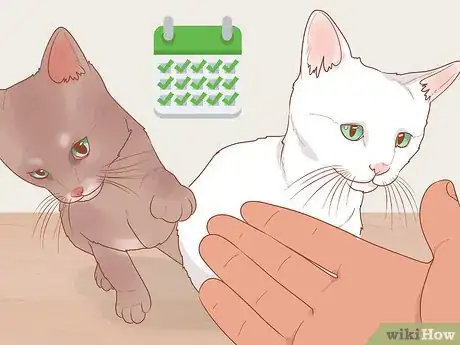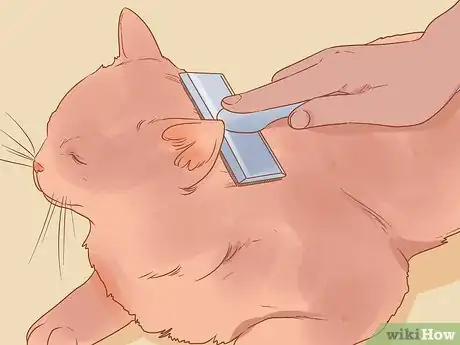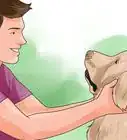This article was co-authored by Brian Bourquin, DVM. Brian Bourquin, better known as “Dr. B” to his clients, is a Veterinarian and the Owner of Boston Veterinary Clinic, a pet health care and veterinary clinic with three locations, South End/Bay Village, the Seaport, and Brookline, Massachusetts. Boston Veterinary Clinic specializes in primary veterinary care, including wellness and preventative care, sick and emergency care, soft-tissue surgery, dentistry. The clinic also provides specialty services in behavior, nutrition, and alternative pain management therapies using acupuncture, and therapeutic laser treatments. Boston Veterinary Clinic is an AAHA (American Animal Hospital Association) accredited hospital and Boston’s first Fear Free Certified Clinic. Brian has over 19 years of veterinary experience and earned his Doctor of Veterinary Medicine from Cornell University.
There are 12 references cited in this article, which can be found at the bottom of the page.
This article has been viewed 91,970 times.
From cats and dogs to rabbits and reptiles, all pets need to be treated with kindness. No matter which type of animal you own, there are plenty of ways to be nice to your pet. Play with your best bud and spend quality time together to strengthen your bond. Learn about how it communicates, and respect its space if it wants to be left alone. In addition to showing your pet affection, be sure to provide proper care to keep it happy and healthy.
Steps
Bonding with Your Pet
-
1Play with your pet every day. To give your pet the physical and mental exercise it needs, do your best to play together every day. If you have a dog, play games like fetch and hide and seek.[1] If you have a cat, play with feathers, streamers, string, and toy mice.[2]
- Daily playtime is especially important if you have a cat or dog. However, other animals need playtime, too. For instance, rabbits need some time out of their cage to exercise.
- Make sure a room is safe before letting a rabbit, rodent, or other small pet out of its cage. To keep it safe, set up a pen so it can’t escape.
-
2Scratch and rub your pet where it likes to be touched. As long as you handle your pet properly, physical contact is a great way to build your bond. Animals have different favorite spots, so learn where your pet likes to be rubbed or scratched. For example, if you have a dog, try scratching its ears and rubbing its belly to show it how much you care.[3]
- If you have a cat, let it rub its face against your hand, scratch its head, and stroke it from its nose to its tail. [4] Cats usually don't like having their belly or tail touched.[5]
- While people show affection by hugging, most cats and dogs don’t like to be hugged. For rabbits, rodents, and other small furry friends, be sure to use a gentle touch. Note that rabbits get stressed out when they’re over-handled.
Tip: Before you touch your cat or dog, hold your hand near its nose and let it give you a sniff to avoid startling it.
Advertisement -
3Give your pet plenty of praise. Use a happy tone of voice and tell your pet how much you love it. When it obeys a command or behaves well, heap on the praise to let it know it’s doing a good job.[6]
- Both cats and dogs can recognize words and tell the difference between happy and angry tones. Additionally, from rabbits to horses, lots of other animals can identify happy tones and words.
- If you have a reptile, it may not hear or understand verbal praise, but you can still gently stroke its head or offer tasty treats to show your affection. Just be careful if you have a snake or other reptile that might bite.
-
4Talk to your pet with a soothing voice daily. Just as praise strengthens your bond, using a calm, soothing voice can help your pet become more comfortable with your presence. When you get home, try greeting your pet by saying something like, “There's my little puppy dog,” or, “Who's the best kitty in the whole world” in a gentle, comforting tone of voice.[7]
- When you're hanging out with your little bud, try scratching its favorite spots to be pet and softly tell it how much you love it. That'll make it feel super safe and cozy!
-
5Reward your pet with healthy treats. Feeding a cat or dog by hand is one of the best ways to strengthen your bond.[8] Offering treats when your pet obeys a command can also help you encourage it to behave.[9]
- Treats can also help you bond with lots of other types of pets, such as rabbits and parrots.[10]
- Keep in mind too many treats can put your pet’s health at risk. As a rule of thumb, treats should account for less than 10% of your pet’s diet. Small slices of carrot or apple are healthy options for dogs. Catnip is the perfect way to reward your cat without adding extra calories to its diet.[11]
Showing Your Pet Respect
-
1Give your pet space if it doesn’t want to be touched. Get to know how your pet communicates, and respect its boundaries if it wants to be left alone.[12] Different types of animals communicate in unique ways, so do a little research on how your pet expresses itself. For instance, a dog is happy when it wags its tail, but a cat that's wagging its tail is agitated.[13]
- Other signs of agitation in cats include a hunched back, fur standing on end, ears pinned back, hissing, and growling.
- For dogs, signs of stress include pinned back ears, a rigid body, wide eyes, yawning, growling, and excessive barking.[14]
-
2Keep its environment as stress-free as possible. Do your best to keep things calm and predictable. Stick to a regular schedule, avoid frequently rearranging furniture, and never taunt your pet. Animals love routines; unpredictability and lots of commotion are upsetting for pets.[15]
- Additionally, if you have multiple pets, keep them separate if they don’t along. If you have a small animal, like a rabbit, make sure your cat or dog can’t go near it.
-
3Avoid sneaking up on or startling your pet. Try not to touch or approach your pet from the back. If you do, say something like “Hi pup!” or “Here kitty!” to announce your presence. Never intentionally try to scare or sneak up on your pet.[16]
- Startling a pet stresses it out, and a cat or dog could scratch or bite you. Some pets, such as rabbits, may experience serious health issues if they’re startled.
Let sleeping dogs lie: If your pet is sleeping, let it rest to avoid spooking it. Even nice cats and dogs can scratch or bite when they’re woken up suddenly.
-
4Make sure everyone in your family knows how to respect animals. Whether you’re a parent or child, discuss the right ways to treat your pet with the rest of your family. If you have younger siblings, make sure they know how to respect your pet’s space and aren’t rough with it.[17]
- If you’re a parent, talk to your kids about treating animals with respect from a young age. To prevent accidents, always supervise your younger children when they interact with pets.
Keeping Your Pet Healthy
-
1Take your pet to the vet regularly. Annual check-ups are recommended for most pets. If your pet is older or has a long-term illness, it’ll need to see the vet more often. If you have a cat or a dog, be sure it receives all vaccinations required by your local laws.[18]
- You should also regularly give your cat or dog medication to prevent fleas and ticks.
-
2Feed it a balanced diet to help it maintain a healthy weight. Obesity dramatically increases your pet’s risk of injury and illness, so keep its diet in check. Buy commercial pet food labeled for your animal's age and species, measure the amount of food you offer, and give your pal treats in moderation.[19]
- Check the pet food label or talk to the vet about the right amount of food to give your pet each day.
-
3Make sure your pet gets plenty of exercise every day. Exercise can also help keep your pet’s weight in check, so play with it and provide enriching toys to keep it active. If you have a dog, be sure to take it on daily brisk walks.[20]
- The right amount of exercise depends on your pet's age and species. For instance, a lap dog needs less exercise than a working breed, and a puppy or senior dog can't run around as much as a healthy adult dog.
-
4Protect it from extreme temperatures and other hazards. If your cat or dog spends a lot of time outside, make sure it has access to a shelter with a roof. Avoid keeping your pet outside in hot weather or if the temperature is below freezing.
- If you keep your pet in a cage or tank, make sure the conditions meet its specific needs. For instance, if you own a reptile, maintain the temperature and humidity levels recommended for its species.
-
5Keep your pet clean and well-groomed. Brush your furry friend at least a few times a week; pets with long coats need daily brushing. If you have a dog, wash it every 2 to 4 weeks or if it gets dirty. Cats are meticulous about grooming, so they generally don’t need baths.[21]
- Grooming requirements vary by species, so check with the vet if you’re not sure about your pet’s needs.
- If you keep your pet in a cage or tank, be sure to clean its habitat regularly.
Expert Q&A
-
QuestionHow do I choose healthy dog food?
 Brian Bourquin, DVMBrian Bourquin, better known as “Dr. B” to his clients, is a Veterinarian and the Owner of Boston Veterinary Clinic, a pet health care and veterinary clinic with three locations, South End/Bay Village, the Seaport, and Brookline, Massachusetts. Boston Veterinary Clinic specializes in primary veterinary care, including wellness and preventative care, sick and emergency care, soft-tissue surgery, dentistry. The clinic also provides specialty services in behavior, nutrition, and alternative pain management therapies using acupuncture, and therapeutic laser treatments. Boston Veterinary Clinic is an AAHA (American Animal Hospital Association) accredited hospital and Boston’s first Fear Free Certified Clinic. Brian has over 19 years of veterinary experience and earned his Doctor of Veterinary Medicine from Cornell University.
Brian Bourquin, DVMBrian Bourquin, better known as “Dr. B” to his clients, is a Veterinarian and the Owner of Boston Veterinary Clinic, a pet health care and veterinary clinic with three locations, South End/Bay Village, the Seaport, and Brookline, Massachusetts. Boston Veterinary Clinic specializes in primary veterinary care, including wellness and preventative care, sick and emergency care, soft-tissue surgery, dentistry. The clinic also provides specialty services in behavior, nutrition, and alternative pain management therapies using acupuncture, and therapeutic laser treatments. Boston Veterinary Clinic is an AAHA (American Animal Hospital Association) accredited hospital and Boston’s first Fear Free Certified Clinic. Brian has over 19 years of veterinary experience and earned his Doctor of Veterinary Medicine from Cornell University.
Veterinarian Look for dog food that has ingredients you recognize and can pronounce, like chicken, beef, fish, and grain. Avoid foods that have a lot of unfamiliar additives, dyes, and colors. Also, make sure you're choosing the right kind of dog food for the breed you have. For example, giant breeds like Newfoundlands need special large-breed dog food so they get all of the nutrients they need.
Look for dog food that has ingredients you recognize and can pronounce, like chicken, beef, fish, and grain. Avoid foods that have a lot of unfamiliar additives, dyes, and colors. Also, make sure you're choosing the right kind of dog food for the breed you have. For example, giant breeds like Newfoundlands need special large-breed dog food so they get all of the nutrients they need.
Warnings
- Never hit your pet; it’s an ineffective punishment. Rewarding good behavior and ignoring your pet when it misbehaves is more effective than hitting it.⧼thumbs_response⧽
References
- ↑ Indigo Will. Professional Canine Expert. Expert Interview. 8 September 2020.
- ↑ https://www.americanhumane.org/fact-sheet/exercising-your-pet/
- ↑ https://dogtime.com/dog-health/dog-behavior/4694-show-dog-love
- ↑ https://cattime.com/cat-facts/how-to/18459-5-ways-to-show-your-cats-love-that-they-can-understand
- ↑ Brian Bourquin, DVM. Veterinarian. Expert Interview. 20 December 2019.
- ↑ Indigo Will. Professional Canine Expert. Expert Interview. 8 September 2020.
- ↑ https://dogtime.com/dog-health/dog-behavior/4694-show-dog-love
- ↑ https://dogtime.com/dog-health/dog-behavior/4694-show-dog-love
- ↑ Brian Bourquin, DVM. Veterinarian. Expert Interview. 20 December 2019.
- ↑ https://fall2016.iaabcjournal.org/human-avian-bond/
- ↑ https://www.avma.org/public/PetCare/Pages/yourpetshealthyweight.aspx
- ↑ Brian Bourquin, DVM. Veterinarian. Expert Interview. 20 December 2019.
- ↑ https://www.spcaflorida.org/blog/tips-for-staying-safe-around-pets/
- ↑ Indigo Will. Professional Canine Expert. Expert Interview. 8 September 2020.
- ↑ Indigo Will. Professional Canine Expert. Expert Interview. 8 September 2020.
- ↑ https://www.avma.org/public/Pages/Recognizing-risky-situations-.aspx
- ↑ https://www.americanhumane.org/fact-sheet/cats-kids-2/
- ↑ https://www.avma.org/public/PetCare/Pages/responsible-pet-ownership.aspx
- ↑ https://www.avma.org/public/PetCare/Pages/yourpetshealthyweight.aspx
- ↑ https://www.avma.org/public/PetCare/Pages/yourpetshealthyweight.aspx
- ↑ https://www.americanhumane.org/fact-sheet/grooming-your-pet/
About This Article
To be nice to your pet, spend time playing with it every day so it doesn't get bored or lonely. Also, praise your pet a lot and give it healthy treats whenever it does something right. You should also give your pet plenty of exercise every day and feed it a balanced diet so it stays happy and healthy. For more advice from our Veterinary co-author, like how to respect your pet's boundaries, keep reading!










































































